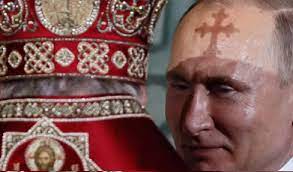[ad_1]
The Russian occupation of Ukraine, which has been going on for more than two weeks, could have concrete consequences in the complex situation of the Orthodox Christian Church in Ukraine, to which millions of people belong and which is currently going through a crisis situation.
Since the 17th century, the Ukrainian Orthodox Church has been led by the Russians. In the Orthodox Christian religion, unlike the Catholic one, there are about fifteen religious leaders with the same authority. They are called patriarchs and each controls a different orthodox church, in relation to others, as a kind of federation.
The only patriarch who stands a little higher than the others, but only for historical reasons, is the patriarch of Constantinople, the old name of Istanbul, who is currently called Bartholomew I.
The Russian Orthodox Church, that of the Moscow Patriarchate headed by Cyril I, has the largest number of believers.
With the conquest of Crimea and the Donbas, a significant part of the Ukrainian Orthodox Church chose to secede from the authority of the Patriarch of Moscow, asking Bartholomew I to become autonomous. Thus were born two churches in Ukraine, the first the Independent Ukrainian Orthodox Church and the Ukrainian Orthodox Church, which remained loyal to Patriarch Kirill I of Moscow.
At present, according to an estimate quoted by the Christian Science Monitor, about seven thousand Ukrainian parishes belong to the former, while 12 thousand have chosen to remain loyal to that of Moscow.
The recent invasion of Russia could bring new changes.
“It is very likely that some parishes of the Ukrainian Orthodox Church, angered by the Russian occupation, may secede from Moscow and join the Ukrainian Orthodox Church.Wrote Jonathan L. Zecher, a scholar of Orthodox Christianity at the Australian Catholic University, in The Conversation.
The Moscow Patriarchate has for years been linked to the authoritarian government of Vladimir Putin and has in fact supported the decision to invade Ukraine. Patriarchs Cyril I and Putin share a certain worldview, including contempt for democratic values, as well as nostalgia for a closer relationship between society and Christianity, and in many cases have supported each other over the years.

Putin has filled the Orthodox Church with favors, exempting it from taxes, to the space on public and private television. In return, the Kremlin leader gained personal legitimacy and political support.
In a statement issued shortly after the invasion, Cyril I spoke of the fact that some “forces of evil” were threatening Russia, adhering to the state propaganda initiated by Putin, and in the following days he had asserted without any evidence that in Donbass several churches were forced to take part in protests in favor of the LGBT + community.
However, there are signs that some parishes of the Ukrainian Orthodox Church, that is, what has remained loyal to Moscow so far, are beginning to view with concern the close link between Patriarch Cyril I and the Putin government.
The Council of Bishops of the Ukrainian Orthodox Church spoke openly about an “invasion” by Russia and urged Cyril I to use his friendship to persuade Putin not to invade Ukraine.
top channel
[ad_2]
Source link















